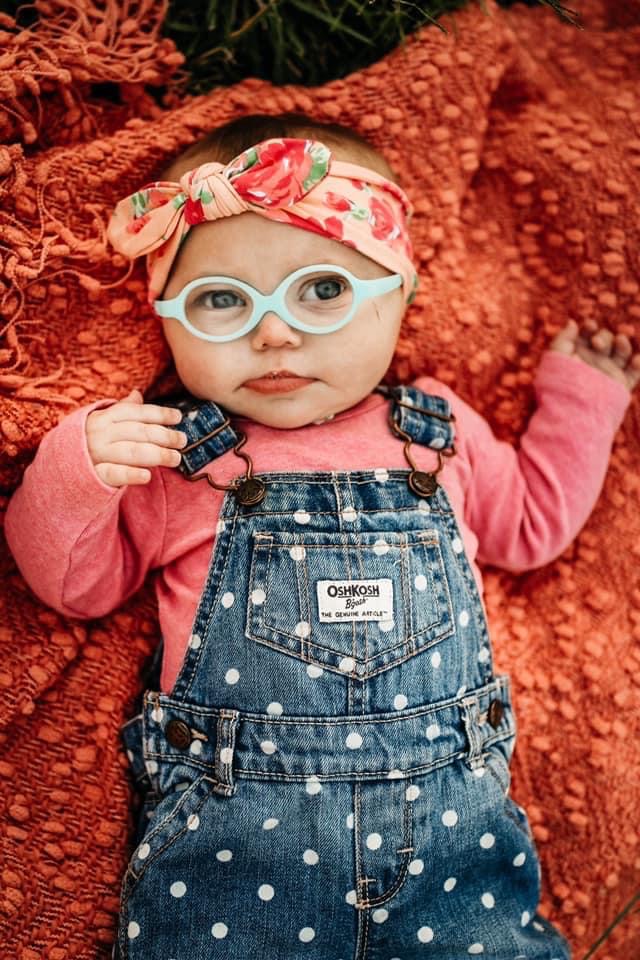The first time I advocated for Landry, it really didn’t feel like much. It wasn’t a defiant, hands-on-my-hips, dig-my-heels-in sort of moment that I sometimes mentally associate with advocacy. Although, I will say, I’ve had some of those moments since and Pete would tell you that I’m especially good at the hands-on-my-hips part, whether I’m speaking up for Landry or not.
I was confident Landry couldn’t see; that’s how it started. I couldn’t explain how I knew, I just did. I’m starting to learn that that’s just how moms work. I was as certain that Landry couldn’t see as I was that the grass is green and the sky is blue. I mentioned in a previous post that Landry was not making any eye contact, visually tracking any objects, and was not following me out of a room or searching for me like a baby of her age should be. This was hard for obvious reasons – a lot of bonding happens through eye contact – but it was also clear that something was wrong. I knew it could be something beyond vision, but I also knew that vision, or lack thereof, was not going to help anything. Truth be told, I wasn’t sure Landry had any sight at all. You could have told me she was blind and I would not have been shocked. Devastated, of course, but not shocked.
Landry’s pediatrician at the time was truly amazing. She was right on the ball with her developmental concerns and I’m often very thankful that she didn’t waste any time. However, our initial list of referrals lacked one that I felt should be on the list and wasn’t: pediatric ophthalmology. I told our doctor that I was confident Landry couldn’t see and I wanted to see an ophthalmologist. I could tell that she didn’t agree with me. In fact, I think she came right out and said that she didn’t think it was a problem with Landry’s eyesight. Regardless, she did it anyway. There. I did it. I advocated for Landry and that’s literally all it took. All I had to do was ask and, lo and behold, I got just what I requested, however reluctantly it was. It wasn’t hard and was the gentle introduction to speaking up for Landry that I didn’t realize I needed.
If I could offer one big piece of advice, it would be this: if a doctor does not take you seriously as your child’s best (or maybe only) advocate or, at the very least, cannot provide a satisfactory explanation that eases your mind, they are probably not the doctor for your child. It doesn’t mean they’re a bad doctor. It doesn’t mean your opinions are too strong. It doesn’t mean their medical advice might not be great for another child. It means only one thing: you are not a good fit for each other and that is OK!
If you didn’t know, pediatric ophthalmologists are not easy to come by. There are only two in Illinois outside of Chicago so they are in pretty high demand and hard to get into, especially when being established as a new patient. While we were waiting on the referral process, however, I had a scare with Landry’s eyes. Changing her diaper one day, I happened to notice that her pupils were different sizes. I knew enough to know that this could be dangerous so I immediately called her doctor (I think still not knowing what, if anything, was going on with her neurologically exacerbated my worry). Our pediatrician saw her that afternoon and, thankfully, felt comfortable clearing us to wait to see the eye doctor. This could have warranted an MRI of the brain, but our doctor was not in favor of unnecessarily sedating a five-month-old and wanted to defer to the eye doctor; I agreed. The good news in that situation was that it did speed up our wait to be seen. Even faster than that, they worked us into a cancellation and we were seen the very next week – hallelujah!
Our first appointment was a long one. If I remember correctly we were there for almost four hours. We waited a while, were seen for medical history and intake questions, eyes dilated, waited again, and then finally examined. I was nervous that morning. I was nervous that, for some crazy reason, her vision was going to be fine and I was going to feel really silly for pushing it. I’ve been asked a lot how you can write an eyeglass prescription for someone who can’t tell you what they’re seeing. Because it’s way out of my league to explain the specifics, I’ll just say that it was really fascinating. With her eyes dilated and me holding her still, they were able to use different magnifications to determine her visual ability and her prescription. As it turned out, Landry did have eyesight (praise God!), but, as I expected, it was not good.
Landry had a farsighted prescription so strong that it put her in the category of “severe.” While she did have vision, she was not able to see anything around her that wasn’t blurry. I have tried before to make an actual determination of what this means in terms of distance, but unfortunately, there’s no straightforward conversion of visual acuity to diopters (measurement by which eyeglass prescriptions are written). Her prescription was actually so strong that she could not be started out in a full-strength pair of glasses. We would start her off with half of her prescription and then give her the rest six months later. Unfortunately, between Landry’s hospitalizations, COVID, and a few other circumstances out of my control, this actually still has not happened, but that’s a story I plan to dive into another day.
Once again, we had a doctor, her staff, and a plan that I felt completely comfortable with as we left the office that day, but despite that, I remember feeling a very broad range of emotions as we left as well. It feels strange to say that I felt happy, but in some ways I really did. Of course, the most obvious reason being that, with correction, Landry would be able to see well, but there was also a huge satisfaction within myself that I knew my baby so well and felt strongly enough to ask for what she needed. This was like the mother (no pun intended) of all “I told you so!” moments! On the other hand, though, I was saddened by the fact that Landry had lived five months in a world she couldn’t really see. She had never clearly seen my face or Pete’s or Chandler’s. She had never clearly seen her toys or made out the pattern of the wallpaper in her nursery. I truly can’t imagine that, but found comfort in the fact that she didn’t know any differently. Mostly, though, I felt hopeful. I was hopeful that glasses were going to really turn things around developmentally for Landry. It made perfect sense; of course you are not going to track objects that you can’t see, you are not going to play with toys that aren’t interesting to you, and you’re definitely not going to make eye contact with faces you can’t identify.
At the time, I didn’t realize what a long road we still had ahead of us with Landry. But after a couple very long, scary, uncertain months, this was a welcome dose of encouragement. The specialty medical world sometimes seems to just be a big game of “hurry up and wait,” but, finally, we had done something in a timely manner that had actually proven to be very necessary and successful, whether or not it fully explained her delay (spoiler alert: it didn’t). Plus, if nothing else, Landry looked really stinking cute in her new turquoise frames. I involved Chandler by letting her choose the color of them, within reason. We had fun doing this together and it was also the beginning of me realizing how important it is to involve her in Landry’s care.

I tell you this story to, quite simply, say this: YOU know your baby better than anyone else ever could. Doctors are medical experts, but they are not experts on your child; only you can fill that job description. If something doesn’t seem right it very well might not be. If you’re questioning something, ask. If you’re not taken seriously, find someone who will. If you’re not satisfied with your experience somewhere, move on. The very worst thing that could happen is that you could be wrong (I get it, I don’t like being wrong either). But the very best thing that could happen is that you’re right, which you probably are, and you get to provide opportunities and care for your child in a way that no one else can do. Trust your gut, mamas. We are the best at that. Ask the questions. Have the intimidating conversations. No one can love or speak for your child like you can. We believe in our kids and it’s time to believe in ourselves and our instincts as well.
xo – Lindsay
** I’m honored and excited that you’re here as I continue to tell the story of our road to Landry’s diagnosis and beyond. I plan to be an open book in hopes that our story can be a blessing to someone else. I absolutely will welcome and happily answer any questions about our journey or Landry’s diagnosis. If you want me to elaborate on anything at all, please just ask!


A wonderful “story” with so many good points for all mothers. You are obviously a fantastic Mom and an excellent writer!
LikeLike
Lindsay, you have an exceptional ability to convey your journey with Landry in this blog. I’m sure somewhere along the way you will help some other mommas take the necessary steps to be the best advocate for their own child.
LikeLike
We are all blessed to have you and your wonderful family in our lives and community! I have no doubt that God has special plans for both of your gorgeous daughters! Thank you for sharing your story with us! We are here for you. xoxo
LikeLike